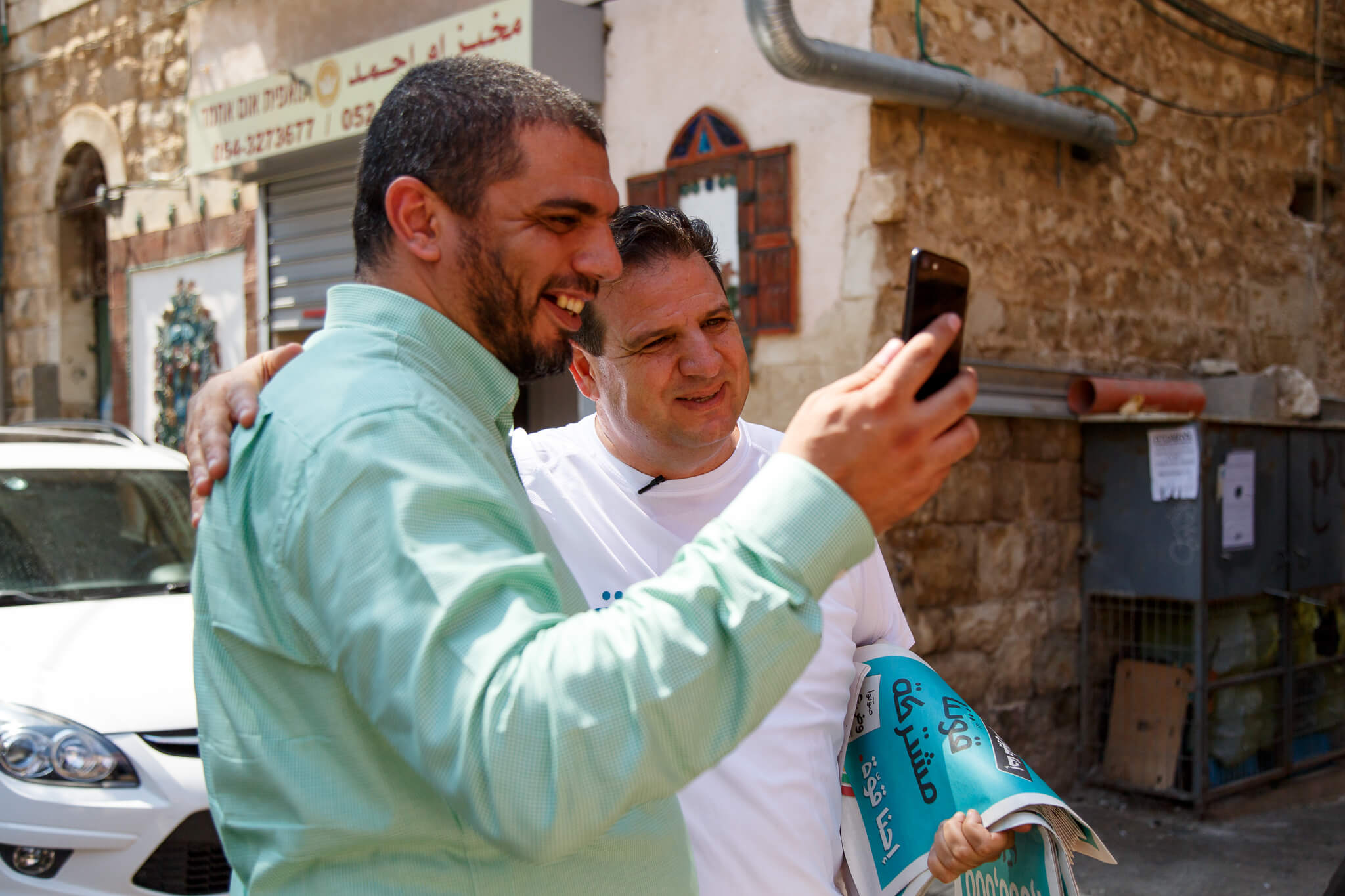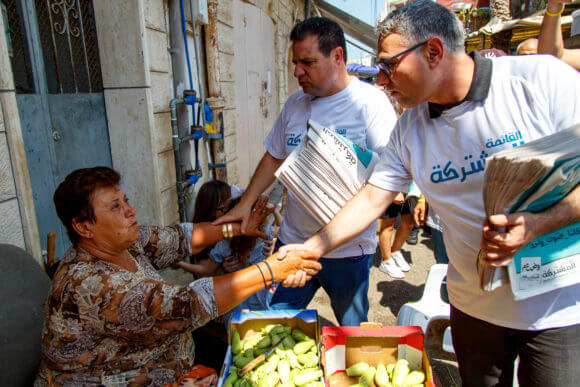Israelis will hit the polls again in a snap election on September 17, after incumbent Prime Minister Benjamin Netanyahu failed to form a coalition government in April.
In the final days of the campaign, members of the newly reformed Joint list – an electoral alliance of the four main Arab parties – were out in a last-ditch attempt to rally Palestinian communities across Israel.
In Haifa, the leader of the Joint List, Ayman Odeh was campaigning for much-needed votes in the Arab neighborhood of Wadi Nisnas. Nearly all street corners, balconies and shops around Wadi Nisnas were adorned with Joint List banners.
“It’s simple,” Odeh told Mondoweiss, “if the percentage of voting as an Arab community in the Israeli state can reach 65 percent, we will bring down Netanyahu and his right-wing [government].”
Their catchphrase “our unity is our strength,” a far cry from the April elections where the four Arab parties – Hadash, Balad, Ta’al and the United Arab List – separated, to form two lists on the ballot.
This failure to unify, according to Dr. Thabet Abu Rass, co-executive director of the Abraham Initiatives, was the reason Arab-voter turnout hit a record low in April.
“The response by the Arab community and Arab citizens was to either boycott the election, this is why the turn-out dropped to 49.1 percent,” compared to 63 percent in the 2015 election when they ran as a unified party. Moreover, in the case of last spring’s election part of the base abandoned the Joint List “to vote for Zionist parties,” Abu Rass said.
Around 30 percent of the total Arab vote in the last election went to Zionist parties, mainly to the center-left, Meretz. “It was huge. It was an unprecedented turnout since the last 20 years,” Abu Rass told Mondoweiss.
The result also meant Arab parties went from 13 seats won in the 2015 elections, down to 9. This election, however, the Joint List looks set to regain what they lost. “The public opinion has predicted we will pick up 12 seats,” Odeh said. “But we still have to work hard to gain these 12 seats, and hopefully more.”
Polls from the Abraham Initiative have found only 42 percent of Arab voters are certain they will vote on September 17 – nearly one-third of the Arab electorate have indicated they are yet undecided.
But there is renewed hope for the upcoming ballots for Arab leaders and constituents. Not only has the Joint List reunited, but Netanyahu’s failure to form a government, and recent bid to win right-wing votes by delegitimizing Palestinians, may backfire.

Ahead of the vote, Netanyahu renewed his pledge to annex illegal Israeli settlements in the occupied West Bank, including the Jordan Valley and the Northern Dead Sea where some 65,000 Palestinians and 11,000 illegal Israeli settlers live. This area includes 30 percent of the West Bank, mainly comprising of Area C, under Israeli military control already.
Leader of the Arab Balad Party, Mtanes Shehadeh, who was also out campaigning the streets of Wadi Nisnas told Mondoweiss that Netanyahu’s recent comments and actions may provoke Arab-Israelis into voting against him.
“[His comments] make Arab voters understand the danger for continuing the Netanyahu government, and of Netanyahu ruling the country,” Shehadeh explained. “What he said is not only for the campaign, he believes in this. This is why we have to vote to send Netanyahu home.”
Ayman Odeh has also condemned Netanyahu’s comments, telling Mondoweiss they are all connected to Trump and his administration’s Middle-East peace plan which is slated to be released after the Israeli elections.
“Trump and Netanyahu want to cancel and delete the Palestinian issue,” Odeh said. “The main aim of their ‘deal of the century’ is the continuance of Palestinians living under military law, and that means there is no peace and no security.”
With latest statistics polling Gantz and Netanyahu neck-and-neck, some have realized the Arab block might be the deciding factor if votes come down to the wire. Research suggests that Arab voters want to see inclusive messages from Jewish and Zionist leaders. And this, according to Abu Rass, is exactly what Gantz is doing.
“You see in the Arab communities unprecedented billboards in [the] Arabic language with photos of Gantz saying [the Blue and White party] promises to deal with their major challenges, such as the issue of violence against Arabs. This is something new that has never happened before.”
Ayman Odeh has said that if certain conditions are met, such as abolishing the Nation-State Law and the ending the occupation of Palestine, he would consider forming a coalition with the Blue and White Party.
Talking with Mondoweiss, Shehadeh quickly dismissed this statement. “Under no conditions will The National Democratic Assembly (Balad) be part of an Israeli coalition or government. We can’t be part of a government of occupation that upholds discrimination, house demolitions, kills our people, and the Gaza situation.”
Walking through the streets, Shehadeh and Odeh seemed like likely heroes, shaking hands, hugging and rallying his most reliable voter base. However, not all were taken with the campaign fervor.
After the campaign crowds had departed, Mondoweiss sat down with a group of Palestinian citizens of Israel to discuss the elections and chances for Arab representation in the Knesset.
Walid, a 54-year-old Haifa local and English teacher said he doesn’t have much hope for the upcoming elections.
“I don’t take [the elections] seriously anymore, they are all the same,” Walid said, also mentioning voter fatigue from having just passed through the previous elections.
“It will be the same and we don’t have much hope for good change.” Walid pointed to the three others sitting around the table. “We are four people here, and we don’t vote for any of them.”
Another man at the table, Ahmad, who also declined to give his last name, acknowledged this time around was different from the April election. “The joining of the Arab parties has made a big impact on how [Arab-Israeli’s] feel, and feeling represented,” he said. “But no, I probably won’t vote.”



Shehadeh wants to send Netanyahu home, i.e., not to jail. That gives Netanyahu a chance to leave office without risking imprisonment, provided that the Joint List dominates the new governing coalition.
The PBS Newshour ran a fairly long story about the election. Not much about Palestinians, but it did note that 1/6 of the electorate are “Israeli Arabs,” many of whom don’t vote. It also indicated that all the Jewish parties pretty much agree on policies regarding Gaza and the West Bank.